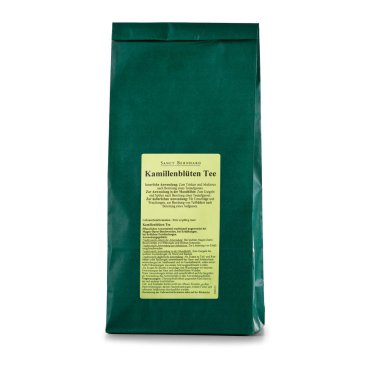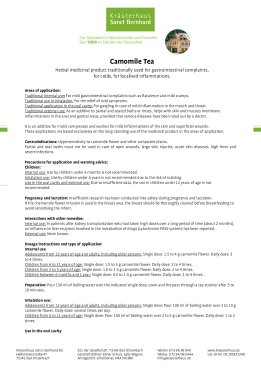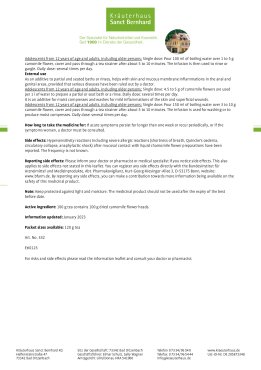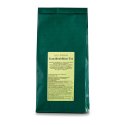Camomile Tea
- Herbal medicinal product traditionally used for gastrointestinal complaints
- Herbal medicinal product traditionally used for colds
- Herbal medicinal product traditionally used for localised inflammations
Active ingredient: 100 g tea contains 100 g dried camomile flower heads.
Herbal medicinal product traditionally used for gastrointestinal complaints, for colds, for localised inflammations.
Traditional internal use: For mild gastrointestinal complaints such as flatulence and mild cramps. Traditional use in inhalation: For the relief of cold symptoms. Traditional application in the oral cavity: For gargling in case of mild inflammation in the mouth and throat. Traditional external use: As an additive to partial and seated baths or rinses, helps with skin and mucous membrane inflammations in the anal and genital areas, provided that serious diseases have been ruled out by a doctor.
It is an additive for moist compresses and washes for mild inflammations of the skin and superficial wounds.
These applications are based exclusively on the long-standing use of the medicinal product in the areas of application.
Teas are our speciality!
Our company history began in 1903 with the production of herbal teas, which soon became extremely popular as a result of their outstanding efficacy for many illnesses and complaints and - for what it's worth - led to many awards, for example gold medals and the honorary prize at exhibitions in Rome and London.
Trust in our years of experience and enjoy a regular cup of healthy, fine-tasting tea from Sanct Bernhard.
Active ingredient: 100 g tea contains 100 g dried camomile flower heads.
Dosage instructions and type of application:
Internal use:
Adolescents from 12 years of age and adults, including older persons: Single dose: 1.5 to 4 g camomile flower. Daily dose: 3 to 4 times.
Children from 6 to 11 years of age: Single dose: 1.5 to 3 g camomile flower. Daily dose: 2 to 4 times.
Children from 2 to 5 years of age: Single dose: 1.0 to 1.5 g camomile flower. Daily dose: 2 to 4 times.
Children between 6 months and 1 year: Single dose: 0.5 to 1.0 g camomile flower. Daily dose: 2 to 4 times.
Preparation: Pour 150 ml of boiling water over the indicated single dose, cover and the pass through a tea strainer after 5 to 10 minutes.
Inhalation use:
Adolescents from 12 years of age and adults, including older persons: Single dose: Pour 100 ml of boiling water over 3 to 10 g camomile flower. Daily dose: several times per day.
Children from 6 to 11 years of age: Single dose: Pour 100 ml of boiling water over 2 to 5 g camomile flower. Daily dose: 1 to 2 times.
Use in the oral cavity:
Adolescents from 12 years of age and adults, including older persons: Single dose: Pour 100 ml of boiling water over 1 to 5 g camomile flower, cover and pass through a tea strainer after about 5 to 10 minutes. The infusion is then used to rinse or gargle. Daily dose: several times per day.
External use:
As an additive to partial and seated baths or rinses, helps with skin and mucous membrane inflammations in the anal and genital areas, provided that serious diseases have been ruled out by a doctor.
Adolescents from 12 years of age and adults, including older persons: Single dose: 4.5 to 5 g of camomile flowers are used per 1 l of water to prepare a partial or seat bath or a rinse. Daily dose: several times per day.
It is an additive for moist compresses and washes for mild inflammations of the skin and superficial wounds.
Adolescents from 12 years of age and adults, including older persons: Single dose: Pour 150 ml of boiling water over 3 to 10 g camomile flower, cover and pass through a tea strainer after about 5 to 10 minutes. The infusion is used for washing or to produce moist compresses. Daily dose: several times per day.
Fields of application:
Traditional internal use: For mild gastrointestinal complaints such as flatulence and mild cramps. Traditional use in inhalation: For the relief of cold symptoms. Traditional application in the oral cavity: For gargling in case of mild inflammation in the mouth and throat. Traditional external use: As an additive to partial and seated baths or rinses, helps with skin and mucous membrane inflammations in the anal and genital areas, provided that serious diseases have been ruled out by a doctor.
It is an additive for moist compresses and washes for mild inflammations of the skin and superficial wounds.
For risks and side effects please read the information leaflet and consult your doctor or pharmacist.









